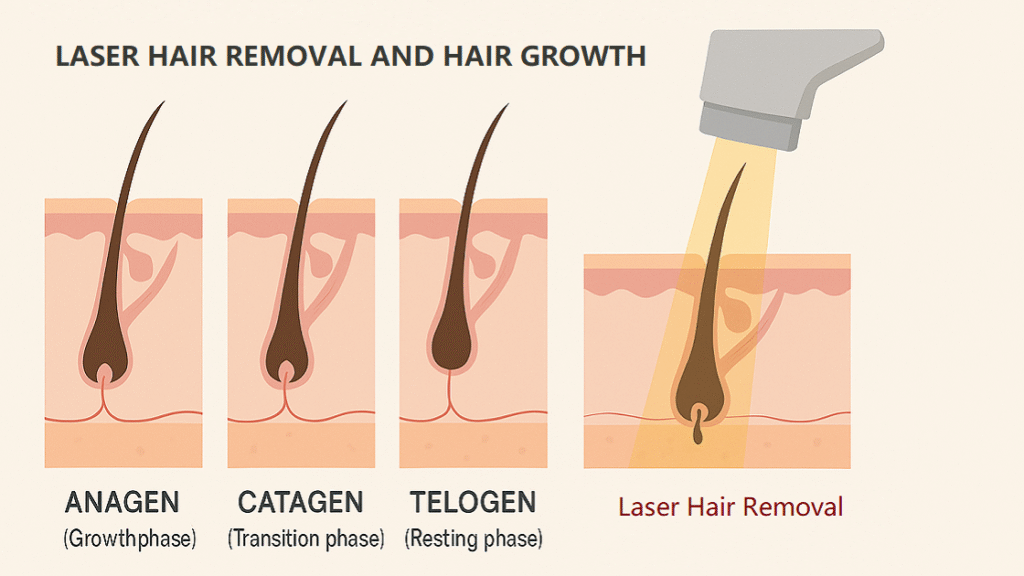Laser hair removal is one of the most popular cosmetic procedures for long-term hair reduction. It’s quick, effective, and widely available—but is it safe for pregnant women? This question often comes up among expecting mothers dealing with sudden and excessive hair growth. In this comprehensive guide, we’ll explore how laser hair removal works, the potential risks during pregnancy, and safer alternatives for managing unwanted hair while expecting.
1. What Is Laser Hair Removal and How Does it Work?
Before discussing safety during pregnancy, it’s helpful to understand how laser hair removal actually works. This procedure uses concentrated light energy to target and damage the hair follicles responsible for hair growth. The pigment in the hair absorbs the laser energy, heating and destroying the follicle to prevent future growth. Laser hair removal is most effective during the active growth (anagen) phase of the hair cycle, which is why multiple treatments are needed. Different types of lasers are used depending on the patient’s skin tone and hair type, including diode lasers, Alexandrite lasers, and Nd:YAG lasers. These devices are FDA-cleared and generally considered safe when administered by trained professionals—though pregnancy introduces unique considerations that change the risk-benefit analysis.

2. Is Laser Hair Removal Safe During Pregnancy?
Many women wonder whether it’s safe to undergo laser hair removal during pregnancy, especially when dealing with new or increased hair growth. However, safety concerns remain due to a lack of clinical research in this area. Most medical professionals and aesthetic clinics recommend avoiding this procedure during pregnancy, and here’s why.
2.1 Lack of Clinical Trials in Pregnant Women
There are currently no robust clinical trials studying the safety of laser hair removal on pregnant individuals. This is largely due to ethical concerns about testing cosmetic procedures on expecting mothers. Without evidence from controlled studies, medical professionals can’t definitively say whether laser treatments are harmless for the fetus or the mother. While anecdotal reports suggest no widespread issues from accidental laser use during pregnancy, the absence of solid data means caution is warranted. Medical researchers and governing bodies typically err on the side of safety. Until large-scale, peer-reviewed studies are conducted, it’s impossible to guarantee that laser hair removal poses no risk to pregnant women or developing fetuses.
2.2 Current Medical Guidelines
Most professional organizations recommend avoiding elective cosmetic procedures—including laser hair removal—during pregnancy. The American College of Obstetricians and Gynecologists (ACOG), while not explicitly addressing laser hair removal, supports a conservative approach to non-essential treatments during pregnancy. Dermatology and cosmetic associations also urge patients to delay laser treatments until after childbirth. These guidelines aim to minimize potential risks, particularly during the first trimester, when fetal development is most sensitive. If you’re pregnant and considering cosmetic treatment, your healthcare provider will likely advise waiting until after your baby is born.
2.3 Why Most Clinics Postpone Laser Treatments for Pregnant Clients
Aesthetic clinics often refuse to perform laser hair removal on pregnant clients—not necessarily because it’s proven dangerous, but because the lack of safety data makes it a legal and ethical gray area. Providers don’t want to expose patients or themselves to potential harm or liability. Furthermore, changes in skin sensitivity and hormone levels during pregnancy may lead to unpredictable results or heightened side effects, such as irritation or burns. This reinforces the industry-wide practice of postponing treatment. In most cases, clinics will ask patients to wait until after delivery and, in some cases, even after breastfeeding.
2.4 Can Laser Radiation Affect the Fetus?
Laser hair removal involves non-ionizing radiation, which means it doesn’t have the energy to alter DNA or deeply penetrate internal organs. In theory, this means the fetus is unlikely to be directly affected by the laser’s light. However, since lasers generate heat and can cause localized inflammation or stress responses, indirect effects can’t be completely ruled out. Also, while the treated area is usually superficial, performing laser near the abdomen or lower back during pregnancy raises additional concerns. For this reason, even if the risk is minimal, experts recommend steering clear of the procedure altogether while pregnant. It’s better to avoid introducing any unnecessary variables into your prenatal care routine.
3. How Does Pregnancy Affect Hair Growth?
Pregnancy brings a host of hormonal changes that impact nearly every system in the body—including your hair growth cycle. Many women experience noticeable differences in hair thickness, texture, and growth patterns. Understanding how pregnancy alters hair biology helps explain why some women become interested in laser hair removal during this time.
3.1 Hormonal Shifts: Estrogen, Progesterone, and Hair Cycle Disruption
During pregnancy, the body produces increased levels of estrogen and progesterone, which can significantly influence the hair growth cycle. Estrogen prolongs the anagen (growth) phase, meaning hair stays in place longer and appears fuller. Progesterone can also impact sebum production and scalp health, potentially affecting hair texture. These hormonal fluctuations often result in luscious, voluminous hair during pregnancy—but they may also trigger unwanted body hair growth in areas like the face, abdomen, and back. The good news is that most of these changes are temporary. Once hormone levels normalize after childbirth, the hair cycle returns to its regular pattern, and excessive hair often falls out naturally.
3.2 Common Hair Growth Patterns During Pregnancy
Many women notice increased hair growth in areas they’ve never had issues with before, such as the belly, breasts, lower back, and face. This sudden emergence of fine or coarse hairs is typically the result of androgenic activity stimulated by pregnancy hormones. While the thick, glossy hair on your scalp may feel like a bonus, the sprouting of new body or facial hair may be unwelcome. These changes are generally harmless and reversible but can be a source of self-consciousness. It’s important to know that you’re not alone—these symptoms are common and usually fade after delivery.
3.3 Temporary vs. Permanent Hair Growth Changes
Most pregnancy-related hair growth changes are temporary. After delivery, the drop in estrogen levels causes many hair follicles to enter the telogen (resting) phase, resulting in postpartum hair shedding. This can be alarming but is a normal part of the cycle and typically resolves within a few months to a year. However, in rare cases, pregnancy can trigger permanent changes in hair distribution, especially if underlying conditions like polycystic ovary syndrome (PCOS) are present. If excessive hair growth persists months after childbirth, it’s worth consulting a dermatologist or endocrinologist to rule out other causes and explore safe treatment options like laser hair removal—postpartum.
3.4 Why Some Pregnant Women Consider Laser Hair Removal
With unexpected hair sprouting on the stomach, chin, or thighs, many pregnant women feel frustrated and seek quick fixes. Laser hair removal, known for its long-lasting results, may seem like an ideal solution. The thought of not having to shave every few days—especially when bending over becomes challenging—can be very appealing. However, convenience shouldn’t outweigh caution. While the urge to maintain your usual grooming habits is understandable, it’s best to explore safer, temporary methods until after your pregnancy. Shaving, trimming, and even threading can offer relief without the unknown risks associated with laser procedures during this sensitive time.
4. What Happens if I Get Laser Hair Removal While Pregnant?
While many clinics advise against laser hair removal during pregnancy, some women may have undergone the procedure before realizing they were pregnant. Understanding the potential implications is crucial for making informed decisions.

4.1 Are There Documented Cases of Adverse Effects?
Current literature lacks robust clinical trials on laser hair removal during pregnancy. However, available case reports and systematic reviews have not identified significant adverse effects on either the mother or fetus. For instance, a systematic review concluded that cutaneous laser treatments during pregnancy appear safe for both mother and fetus, with no significant risks reported. Nonetheless, the absence of comprehensive studies means that potential risks cannot be entirely ruled out. Therefore, many healthcare providers recommend postponing elective laser treatments until after childbirth to err on the side of caution.
4.2 First Trimester: Critical Development Period
The first trimester is a pivotal phase in fetal development, during which major organs and systems begin to form. Any external factors that could potentially interfere with this process are generally avoided. Although laser hair removal is a localized procedure, the lack of definitive safety data during this sensitive period leads many practitioners to advise against it. Hormonal fluctuations during the first trimester can also increase skin sensitivity, potentially leading to heightened discomfort or adverse skin reactions. Given these considerations, it’s prudent to defer laser hair removal until after this critical developmental window.
4.3 Second and Third Trimesters: Safety Zones or Still a Risk?
As pregnancy progresses into the second and third trimesters, some may assume that the risks associated with laser hair removal diminish. While the fetus is more developed during these stages, the absence of comprehensive safety data persists. Additionally, physiological changes such as increased blood flow and skin sensitivity continue throughout pregnancy, potentially exacerbating side effects like redness, swelling, or hyperpigmentation. Therefore, despite the reduced vulnerability of the fetus in later trimesters, many healthcare providers maintain a cautious stance, recommending the postponement of elective laser procedures until after delivery.
4.4 Can Local Treatment Affect Overall Pregnancy Health?
Laser hair removal targets melanin in hair follicles, generating heat to inhibit hair growth. While the procedure is localized and the laser’s penetration is superficial, the body’s systemic response to treatment—such as inflammation or stress—could theoretically impact overall pregnancy health. Moreover, areas commonly treated, like the abdomen or bikini line, are in close proximity to the uterus, raising concerns about potential indirect effects. Although no concrete evidence links laser hair removal to adverse pregnancy outcomes, the theoretical risks underscore the importance of erring on the side of caution and deferring treatment until postpartum.
5. Potential Risks and Considerations
Pregnancy induces numerous physiological changes that can alter the skin’s response to various treatments, including laser hair removal. Understanding these potential risks is essential for making informed decisions about hair removal methods during this period.
5.1 Increased Skin Sensitivity and Risk of Melasma
Hormonal fluctuations during pregnancy can heighten skin sensitivity, making it more reactive to external stimuli. This increased sensitivity raises the risk of adverse reactions to laser treatments, such as redness, swelling, or discomfort. Additionally, pregnancy is associated with a higher incidence of melasma—a condition characterized by dark, blotchy skin patches, often on the face. Exposure to laser energy can exacerbate this pigmentation, leading to more pronounced and persistent discoloration. Given these factors, it’s advisable to avoid laser hair removal during pregnancy to minimize the risk of skin complications.
5.2 Higher Risk of Burns on Hormone-Affected Skin
The hormonal changes of pregnancy can affect the skin’s thickness, elasticity, and moisture levels, potentially increasing susceptibility to burns during laser treatments. Altered skin properties may affect how laser energy is absorbed and dissipated, raising the likelihood of thermal injury. Furthermore, the body’s inflammatory response may be heightened during pregnancy, potentially exacerbating the severity of burns or prolonging healing times. These considerations reinforce the recommendation to postpone laser hair removal until after childbirth, when the skin has returned to its pre-pregnancy state.
5.3 Lower Pain Threshold and More Discomfort in Pregnant Women
Pregnancy can influence pain perception, with many women experiencing a lower pain threshold due to hormonal shifts and physical changes. Procedures that were previously tolerable may become more uncomfortable or even painful. Laser hair removal, which involves the sensation of heat and mild stinging, may thus cause increased discomfort during pregnancy. Additionally, the emotional and physical stress associated with heightened pain can have broader implications for maternal well-being. To ensure comfort and reduce unnecessary stress, it’s generally recommended to defer laser treatments until after pregnancy.
5.4 Why Treating the Abdomen or Bikini Area Is Not Recommended
Treating areas like the abdomen or bikini line during pregnancy raises specific concerns. These regions are in close proximity to the uterus, and while laser energy doesn’t penetrate deeply, the theoretical risk of affecting the fetus cannot be entirely dismissed. Moreover, the skin in these areas undergoes significant stretching and changes during pregnancy, potentially altering its response to laser treatment and increasing the risk of adverse effects like burns or pigmentation changes. Given these factors, most practitioners advise against laser hair removal in these sensitive areas during pregnancy.
5.5 Mental Stress and Anxiety About Laser Safety
Undergoing cosmetic procedures during pregnancy can lead to increased anxiety, particularly when safety data is lacking. Concerns about potential risks to the fetus, coupled with the physical discomfort of treatment, can contribute to heightened stress levels. Chronic stress during pregnancy is associated with various adverse outcomes, including preterm labor and low birth weight. Therefore, avoiding elective procedures like laser hair removal can help minimize unnecessary stress and promote a healthier pregnancy experience.
6. When Can You Resume Laser Hair Removal After Pregnancy?
Postpartum, many women look forward to resuming their regular beauty routines, including laser hair removal. However, it’s important to consider the body’s recovery process and consult with healthcare providers before restarting treatments.
6.1 Postpartum Hormonal Adjustment and Skin Recovery
After childbirth, the body undergoes significant hormonal shifts as it returns to its pre-pregnancy state. These changes can affect skin sensitivity, pigmentation, and hair growth patterns. It’s advisable to allow time for these adjustments before resuming laser hair removal to ensure optimal treatment outcomes and minimize the risk of adverse skin reactions. Typically, waiting until hormonal levels stabilize—often several months postpartum—can lead to more effective and comfortable laser sessions.
6.2 Recommended Waiting Time: 3 Months or More
While individual recovery timelines vary, many practitioners recommend waiting at least three months after childbirth before resuming laser hair removal. This period allows the body to heal, hormones to balance, and the skin to regain its normal characteristics. Additionally, if you’re breastfeeding, it’s important to consider how hormonal fluctuations may continue to affect skin sensitivity and hair growth. Consulting with a healthcare provider can help determine the appropriate timing for restarting laser treatments based on your specific circumstances.
6.3 Medical Clearance Before Resuming Laser Sessions
Before resuming laser hair removal postpartum, obtaining medical clearance from your healthcare provider is essential. This step ensures that your body has adequately recovered from childbirth and that there are no underlying conditions that could increase the risk of complications. Your provider can assess factors such as skin integrity, hormonal balance, and overall health to determine if it’s safe to proceed with laser treatments. This precaution helps safeguard your well-being and enhances the effectiveness of the procedure.
6.4 Skin Testing After Pregnancy for New Sensitivities
Pregnancy can lead to lasting changes in skin sensitivity and reactivity. Before undergoing a full laser hair removal session postpartum, it’s advisable to perform a patch test on a small area of skin. This test can help identify any new sensitivities or adverse reactions, allowing for adjustments in treatment parameters or the decision to postpone further sessions. Conducting a patch test minimizes the risk of widespread skin irritation and ensures a safer, more comfortable experience as you resume laser hair removal.
7. Can You Get Laser Hair Removal While Breastfeeding?

While the concerns of pregnancy may ease postpartum, breastfeeding moms still wonder whether laser hair removal is safe. With no hormones from pregnancy to consider, the focus shifts to how treatments might affect the nursing process.
7.1 Is Laser Energy Absorbed Systemically?
Laser hair removal works by targeting pigment in hair follicles with concentrated light energy. This energy converts to heat and disables hair growth at the follicular level. Importantly, this process occurs at the skin’s surface and does not penetrate deeply enough to affect internal organs or systems. Since the energy is not absorbed systemically, it does not reach the bloodstream or breast tissue, making it unlikely to interfere with breastfeeding. However, some nursing mothers may still experience residual hormonal fluctuations that increase skin sensitivity. For this reason, it’s wise to discuss treatment timing and areas with your healthcare provider to ensure maximum comfort and safety.
7.2 Can Laser Affect Breast Milk Production or Quality?
There is currently no scientific evidence indicating that laser hair removal has any impact on breast milk quality or quantity. Because the laser energy acts only on skin and does not enter the bloodstream or reach the milk ducts, it poses no threat to lactation. The body’s milk production process is governed primarily by hormones and demand-based feedback from the baby—not by localized cosmetic treatments. That said, stress and discomfort can indirectly impact milk let-down, so it’s important to ensure you’re fully comfortable during the procedure. If you experience heightened skin sensitivity due to hormonal changes, you may consider delaying treatment or starting with a small test area.
7.3 Safe Body Areas to Treat While Nursing
While laser hair removal is considered safe during breastfeeding, not all body areas are equally ideal to treat right away. It’s generally best to avoid the chest or areola region due to proximity to the milk-producing glands and the potential for skin irritation during nursing. Instead, focus on areas like the legs, arms, underarms, or lower face. These zones are far from the breasts and less likely to be affected by hormonal changes associated with lactation. Additionally, opt for experienced technicians familiar with treating postpartum clients and always perform a patch test beforehand. Consulting your OB-GYN or lactation consultant can provide personalized reassurance and guidance.
8. Pregnancy-Safe Hair Removal Methods You Can Use Instead of Laser
If you’re avoiding laser treatments during pregnancy or breastfeeding, you’re not out of options. Many tried-and-true hair removal methods are perfectly safe when used appropriately.
8.1 Is Shaving Safe During Pregnancy?
Yes, shaving is one of the safest and most accessible options during pregnancy. Since it removes hair only at the surface, it doesn’t involve chemicals or heat. However, as your belly grows, reaching certain areas (like legs or bikini line) can become difficult—and risky. Use a handheld mirror, sit on a stable surface, and choose a moisturizing shaving cream to avoid cuts and irritation. Consider switching to an electric shaver for even more control. Shaving might not offer long-lasting results, but it’s a no-fuss, hormone-friendly method to keep unwanted hair at bay throughout pregnancy.
8.2 Should You Wax While Pregnant?
Waxing is generally safe during pregnancy but may be more painful than usual due to heightened skin sensitivity. The risk of irritation, bruising, and ingrown hairs increases—especially in areas like the bikini line. If you’ve been waxing regularly before pregnancy, continuing might be fine. But if you’re trying it for the first time, this may not be the ideal moment. Always ensure the wax is not overheated, and consider patch testing a small area before a full session. Opt for salons experienced in treating pregnant clients—they often adjust their techniques and waxing temperature to suit hormonal changes.
8.3 Hair Removal Creams: Ingredients to Avoid
Depilatory creams break down keratin in hair shafts using strong chemicals like calcium thioglycolate and sodium hydroxide. While these creams offer a painless option, some ingredients may be irritating or unsafe during pregnancy. Always check labels and avoid products with strong fragrances, dyes, or unknown chemical agents. The FDA does not regulate all cosmetic ingredients closely, so err on the side of caution. Test a small patch on your skin and consult your healthcare provider before regular use. If you notice burning, itching, or rashes, discontinue use immediately. When in doubt, skip chemical creams and choose more natural alternatives.
8.4 Natural Options: Sugaring and Threading
Natural methods like sugaring and threading have gained popularity among expectant mothers due to their gentle, chemical-free approach. Sugaring involves a paste made of sugar, lemon juice, and water—ingredients you can pronounce and probably eat. It removes hair from the root like waxing but tends to be less painful and more skin-friendly. Threading, often used on facial areas, relies on twisted threads to pull hair out with precision and minimal irritation. Both options are generally safe during pregnancy but still carry a sting. Always go to experienced practitioners, and communicate your pregnancy status to ensure care is taken.
9. Laser Hair Removal in Pregnancy: Myths Busted with Real Facts
Confusion around laser hair removal during pregnancy is fueled by well-meaning but misleading advice. Let’s tackle common myths and replace them with evidence-based facts.
“Laser Hair Removal Can Harm the Baby”
This myth persists despite zero direct evidence of harm. While no large-scale studies prove it’s unsafe, caution prevails due to the lack of comprehensive trials. The laser’s localized nature makes fetal exposure unlikely—but postponement is still standard to minimize unknown risks.
“It’s Safe if You Avoid the Belly Area”
Avoiding the belly may reduce theoretical risk, but pregnancy alters skin sensitivity everywhere. Even seemingly safe areas like legs or arms could react unpredictably due to hormonal shifts. Most clinics follow a blanket no-treatment policy for pregnant clients regardless of the area.
“Hair Grows Faster in Pregnancy, So Laser Is Ideal”
Yes, pregnancy can stimulate hair growth—but that doesn’t mean laser hair removal is the answer. Hormonal changes also make hair more resistant and skin more reactive, reducing treatment efficacy and increasing side effects. Postpartum treatment yields better long-term results.
“Doctors Approve Laser Hair Removal for Pregnant Women”
Most OB-GYNs and dermatologists advise against it. Due to the lack of safety data, the standard medical recommendation is to delay elective laser treatments until after childbirth. If your doctor seems unsure, it’s likely because conclusive studies simply don’t exist.
“Natural Remedies Are Always Safer”
Natural doesn’t always mean harmless. Lemon juice, turmeric pastes, or homemade sugar wax can still irritate sensitive pregnancy skin. While many natural remedies are gentler than lasers, it’s vital to test first and avoid harsh or unproven ingredients.
10. Final Verdict: Should You Postpone Laser Hair Removal?
Yes—postponing laser hair removal during pregnancy is the safest route. While there’s no strong evidence suggesting laser energy harms the fetus, the lack of comprehensive studies makes it impossible to guarantee safety. Add in skin sensitivity, hormonal changes, and increased risk of pigmentation or burns, and it becomes clear why medical professionals recommend waiting. Even if you’re mid-treatment when you discover you’re pregnant, most clinics will pause your sessions until after delivery. In the meantime, safe alternatives like shaving, sugaring, or threading can help you maintain your grooming routine. Once postpartum recovery is complete, you can resume laser treatments with peace of mind and better results.








